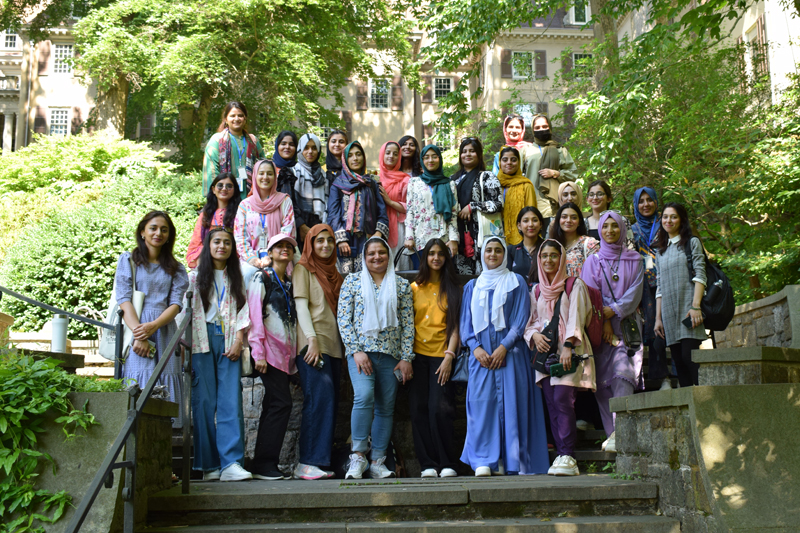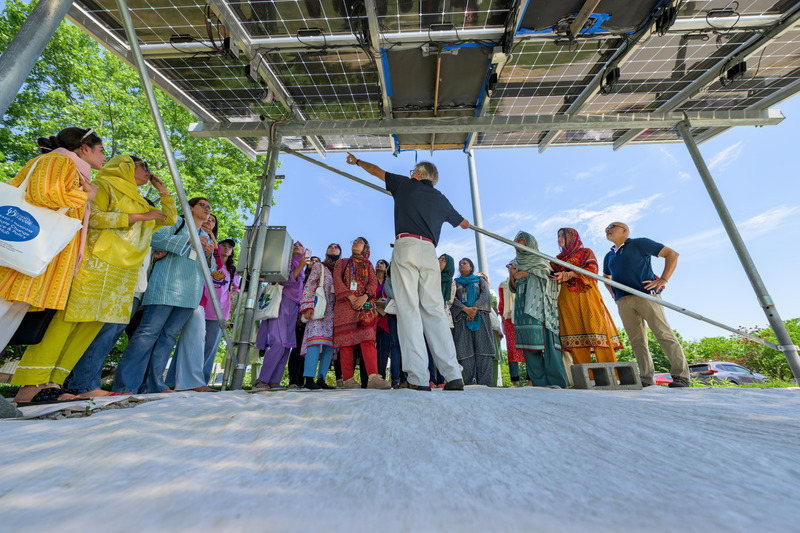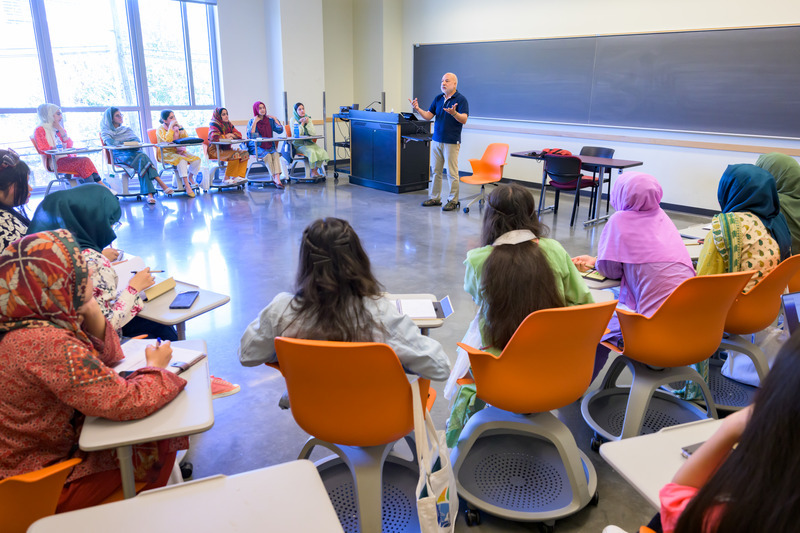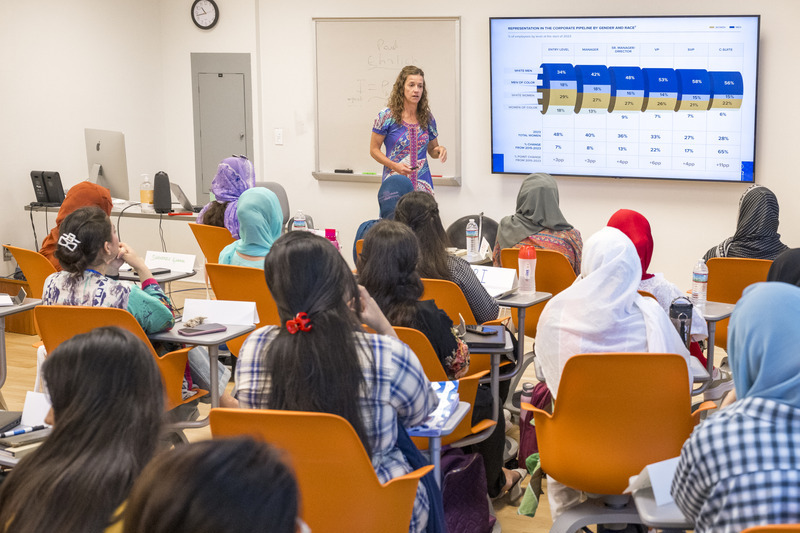


STEM Sisters
Photos by Kathy F. Atkinson and Evan Krape July 23, 2024
UD hosts 27 collegiate women from Pakistan for STEM exchange program
If education is a relay race toward independence, then the 27 Pakistani women who participated in the STEMSisters exchange program at the University of Delaware this summer just took the baton and are ready to run with it.
Historically, most Pakistani women have been prepared to be homemakers, but earning a high school diploma and enrolling in higher education have become more viable alternatives within the last decade. Research shows that in 2020, 25% of Pakistani women are in the workforce, which is an 11% increase since 1991.
The goal of the STEMSisters program is to encourage the women’s educational and career goals in STEM fields while learning about climate change and sustainability. The three-week institute was co-hosted by UD and the American Institute of Pakistan Studies (AIPS). It was supported by the U.S. Embassy in Islamabad.
The program was coordinated by UD’s College of Earth, Ocean and Environment (CEOE), with Dana Veron, associate provost of faculty affairs, and Saleem Ali, Blue and Gold Distinguished professor of energy and environment, as the co-directors. Veron developed the program, and Ali’s relationship with AIPS led to the program’s funding.
For two weeks, the STEMSisters experienced UD’s campus as Blue Hens, residing and dining on campus, attending daily lectures, and visiting the Institute of Energy Conversion — the oldest solar research facility in the world — and the Mineralogical Museum, which features specimens from Pakistan. They also toured Delaware’s Winterthur and Bowers Beach and went on a day trip to the United Nations in New York City. They spent their final week of the program in Washington, D.C.

“Experts from UD and Delaware are sharing knowledge, research and practices on how we, in the United States and in Delaware, are responding to the pressures and impact of climate change, while learning how the STEMSisters participants are experiencing climate, environmental and sustainability challenges in their regions of Pakistan,” Veron said.
The academic and cultural exchange also served as an opportunity to build better connections between the U.S. and Pakistan and support the development of these inspiring future leaders.
As a Pakistani-American, Ali said that he is “conscious of many misunderstandings between residents of both countries about each other. Such programs are vital to build mutual trust and respect and hence an example of what is often referred to as citizen science diplomacy.”
Many of the STEMSisters said that being an educated mother affects society and is as important as the independence that comes with being educated for herself.
“As a mother, you have to be literate to pass information to younger generations,” said Tooba Khan, who is studying economics with an interest in climate change policies.
Globally, women are becoming more educated about their rights and are making more informed decisions when they vote, Khan said. Educating women is one pathway to help meet the United Nations Sustainable Development Goals.
The women, none of whom had ever been to the United States before, quickly embraced American culture while taking in new information at an accelerated pace. They engaged with professors, asking probing questions about topics that piqued their interest and offering their own insights and perspectives. Ismat Shah, professor of materials science and engineering, made the women feel welcomed as he lectured about future energy options for the developing world, specific to Pakistan, in their native language.

While the women enjoyed typical American food, they were also excited that lunch on day five would be haleem, a widely consumed dish in Pakistan.
The STEMSisters program changed the students’ perspectives in many ways and exposed them to new ways of learning.
For Faryal Kehkashan, who is studying computer science to become a researcher, and Pari Saroosh, who is studying pharmacy with a goal of working in industrial pharmacy, it was surprising — and inspiring — to learn that UD professors are also researchers.
“Professors were teaching what they’ve experienced,” Kehkashan said. For Saroosh, this made learning more practical and efficient because professors were able to answer questions in detail as opposed to solely teaching theories and research conducted by others. The experience is nudging Saroosh into considering becoming a teacher someday.
For Moimma Ali Khan, who is studying software engineering to become a UI/UX designer, this unique experience exposed her to interdisciplinary research.
Matt Kinservik, professor of English, shared an overview of the American higher education system. The women appeared amazed that American students have freedom of speech that affords them the opportunity to question professors without fear.
Now, the women aspire to implement their newfound knowledge in Pakistan.
Duaa Aamir is studying cybersecurity to create awareness and help women targeted by cyber crimes. She also learned about the possibility of cleaning river water with plant life and hopes to clean the river that runs through her hometown so that her community can access even more clean water.
The program also highlighted to Aamir that Pakistan is home to exceptionally smart and talented women, including those from “backwards” communities, which is how they commonly refer to their rural areas.
Amanda Bullough, professor of management specializing in global and women’s leadership and co-founder and research director of the Women’s Leadership Initiative at UD, said opportunities like this often help women realize that they share similar challenges, such as female bias.
“Their eyes are opened to a lot of information,” Bullough said. “These women are not only taking home a broader perspective but also an increased skill set and more confidence to accomplish their goals, effect change and be an example.”

Contact Us
Have a UDaily story idea?
Contact us at ocm@udel.edu
Members of the press
Contact us at 302-831-NEWS or visit the Media Relations website

